
Rituparno Ghosh was an Indian film director, actor, writer and lyricist. After pursuing a degree in economics, he started his career as a creative artist at an advertising agency. He received recognition for his second feature film Unishe April which won the National Film Award for Best Feature Film. Having won 19 National Awards, along with his contemporaries Aparna Sen and Goutam Ghose, Rituparno heralded contemporary Bengali cinema to greater heights. Ghosh died on 30 May 2013 in Kolkata after a heart attack. Ghosh was also one of the openly homosexual personalities in Indian cinema.

Behula is a protagonist in the Manasamangal genre of Assamese and Bengali medieval epics. A number of works belonging to this genre were written between the thirteenth and eighteenth centuries. Though the religious purpose of these works is to eulogise the Hindu goddess Manasa, these works are more well known for depicting the love story of Behula and her husband Lakhindar.

Unishe April is a 1994 Indian Bengali-language drama film directed by Rituparno Ghosh and produced by Renu Roy under the banner of Spandan Films. It stars Aparna Sen and Debashree Roy while Prosenjit Chatterjee and Deepankar De appear in supporting roles. The music of the film was composed by Jyotishka Dasgupta.
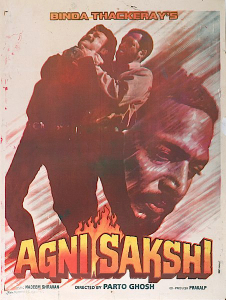
Agni Sakshi is 1996 Indian Hindi-language thriller drama film directed by Partho Ghosh, written by Ranbir Pushp and Hriday Lani, starring Jackie Shroff, Nana Patekar and Manisha Koirala. The music is by Nadeem-Shravan. Nana Patekar and Manisha Koirala were widely appreciated for their performances with Patekar winning the National Film Award for Best Supporting Actor in 1997.
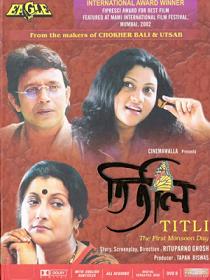
Titli is a 2002 Indian Bengali-language film by Rituparno Ghosh, starring Konkona Sen Sharma, Aparna Sen and Mithun Chakraborty. The film tells the story of a developing adolescent, played by Konkona, and the sensitivity of a teenager, and also the portrayal of the mother-daughter relationship and quiet understanding within the pair.
Debashree Roy also known as Debasree Roy, is an Indian actress, dancer, choreographer, politician and animal rights activist. As an actress, she is known for her work in Hindi and Bengali cinema. She has been cited as the reigning queen of Bengali commercial cinema. She acted in more than a hundred films and won over forty awards, including a National Award, three BFJA Awards, five Kalakar Awards and an Anandalok Award. As a dancer, she is known for her stage adaptations of the various forms of Indian folk dances as well as her innovative dance forms imbued with elements from Indian classical, tribal and folk dance. She runs Natraj dance troupe. She is the founder of Debasree Roy Foundation, a non-profit organisation that works for the cause of stray animals. Roy was a Member of the Legislative Assembly from Raidighi constituency since 2011 till 2021.

Chalo Let's Go is a 2008 Indian drama movie in Bengali starring Ritwick Chakraborty, Rudranil Ghosh, Saswata Chatterjee and Parambrata Chatterjee, written and directed by Anjan Dutt.

Antaheen is a 2009 Bengali film directed by Aniruddha Roy Chowdhury. The film stars Radhika Apte, Rahul Bose, Mita Vashisth, Aparna Sen, Kalyan Ray and Sharmila Tagore.

Nadhaswaram is a Tamil soap opera that aired on Sun TV from 19 April 2010 to 9 May 2015 from Monday through Saturday.
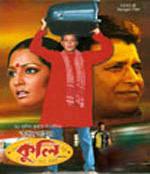
Coolie is a 2004 Indian Bengali-language action drama film directed by Swapan Saha, written by N.K. Salil and produced by Vijay-Laxmi Movies Pvt. Ltd. The film stars Mithun Chakraborty and Meghna Naidu along with Dulal Lahiri, Abhishek Chatterjee, Nishita Goswami, Subhasish Mukherjee in supporting roles. This film marks the Bengali debut of Meghna Naidu and Nishita Goswami. This movie was later dubbed in Bhojpuri with the same title.

Himmatwala is a 2013 Indian Hindi-language action comedy film written and directed by Sajid Khan and jointly produced by UTV Motion Pictures and Vashu Bhagnani. The film features Ajay Devgn and Tamannaah Bhatia in the lead roles. Set in 1983, it is an official remake of the 1983 film of the same name by K. Raghavendra Rao, which was, in turn, a remake of the 1981 Telugu film Ooruki Monagadu. The film was released on 29 March 2013. The film marks Tamannaah's comeback to Bollywood after she debuted in the 2005 film Chand Sa Roshan Chehra. This film received negative reviews and was a disaster at the box office.
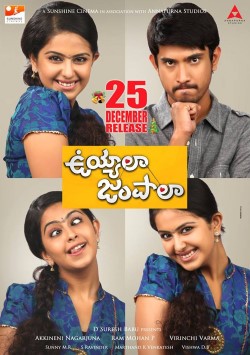
Uyyala Jampala is a 2013 Indian Telugu-language romantic comedy drama film directed by Virinchi Varma, produced by Ram Mohan P and Nagarjuna under Sunshine Cinema in association with Annapurna Studios, starring Raj Tarun and Avika Gor.

Swapno (transl. Dream) is a 2005 Bengali social drama film directed by Haranath Chakraborty. The film features actors Prosenjit Chatterjee and Sayantani Ghosh, Jisshu Sengupta, Abhishek Chatterjee, Deepankar De, Anamika Saha, Rajesh Sharma in the lead roles. Music of the film has been composed by Hemanta Mukherjee, Shyamal Mitra and Madhu Mukherjee.
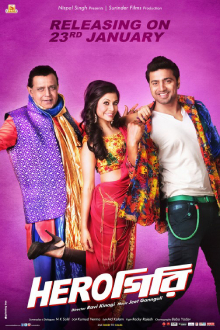
Herogiri is a 2015 Bengali language action comedy film directed by Rabi Kinagi assistant director Pathikrit Basu and produced by Nispal Singh under the banner of Surinder Films. It features actors Mithun Chakrabarty, Dev, Koel Mallick and Sayantika Banerjee in lead roles. It is a remake of the 2013 Telugu movie Balupu.

Nenu.. Sailaja... is a 2016 Indian Telugu-language romantic comedy film directed by Kishore Tirumala and produced by Sravanthi Ravi Kishore, starring Ram Pothineni and Keerthy Suresh. The film was produced by Sri Sravanthi Movies, which also produced Ram's previous film Shivam. It was also released on 1 January 2016. This film marked the Telugu debut of Keerthy Suresh.

Phagun Bou is an Indian Bengali television soap opera that premiered on 19 March 2018 on Star Jalsha. It was produced under Magic Moments Motion Pictures of Saibal Banerjee and Leena Gangopadhyay. The show starred Vikram Chatterjee and Oindrila Sen in lead roles and Koushik Roy in a negative role.

Krishnakoli is a 2018 Bengali language television Soap Opera that premiered on 5 April 2018 and airs on Bengali entertainment channel Zee Bangla. It is produced by Susanta Das of Tent Cinema and stars Tiyasha Lepcha and Neel Bhattacharya in the lead roles. After a journey of 3 and a half years, the show went off-air on 9 November 2022 on a happy note to make way for Pilu.

Nokshi Kantha is an Indian television soap opera in Bengali that premiered on 12 November 2018 and aired on the Bengali General Entertainment Channel Zee Bangla. The show was produced by Magic Moments Motion Pictures of Saibal Banerjee and Leena Gangopadhyay. The show replaced the popular drama series Andarmahal. It aired its final episode on 10 July 2020. Ki Kore Bolbo Tomay took over its time slot starting 13 July 2020.

RadhaKrishn is an Indian Hindi-language mythological television drama series that premiered on 1 October 2018 on Star Bharat and is also digitally available on Disney+ Hotstar. After a successful run of more than 5 years, it went off air on 21 January 2023. The series is a dramatisized version based on the life of Hindu deities Radha and Krishna. It is produced by Siddharth Kumar Tewary, Rahul Kumar Tewary and Gayatri Gill Tewary for Swastik Productions and is directed by Rahul Kumar Tewary. The roles of Krishna and Radha are played by Sumedh Mudgalkar and Mallika Singh. It completed 1145 episodes and is listed among longest running television series of India and also became the longest ran mythological series. It is also the longest running drama series on Star Bharat to date.

Gotro (transl. Clan) is a 2019 Indian Bengali-language emotional family drama film, directed, produced and co-written by Nandita Roy and Shiboprosad Mukherjee. It stars Anashua Majumdar, Nigel Akkara and Manali Dey, with Ambarish Bhattacharya, Saheb Chatterjee and Badshah Moitra. The film revolves around the relationship between Mukti Debi (Majumdar), a widow who lives alone in her mansion, with her caretaker Tareq (Akkara), an ex-convict and shows how their lives undergo a change.



















